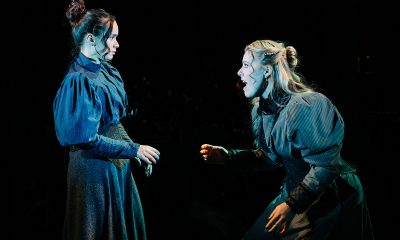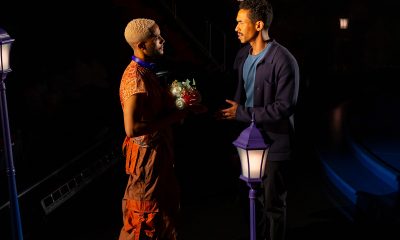Theater
Out actors shine in area productions ‘Anastasia,’ ‘As You Like It’
Jade Jones, Stephen Brower overcame insecurities to forge successful stage careers
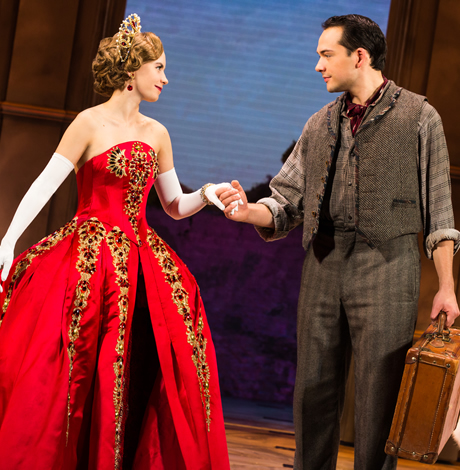
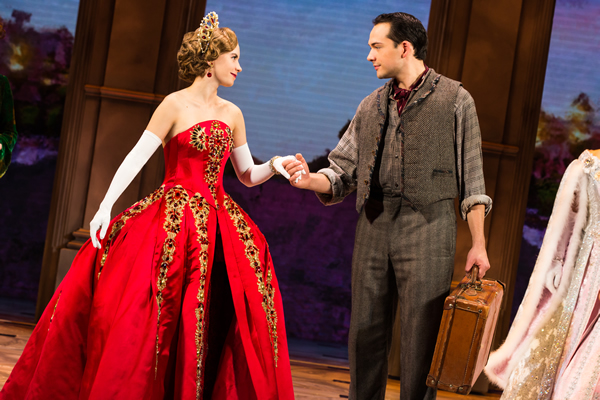
Lila Coogan with Stephen Brower in the national tour of ‘Anastasia.’ (Photo by Evan Zimmerman)
‘Anastasia’
Through Nov. 25
The Kennedy Center
2700 F St., N.W.
$59-179
202-467-4600
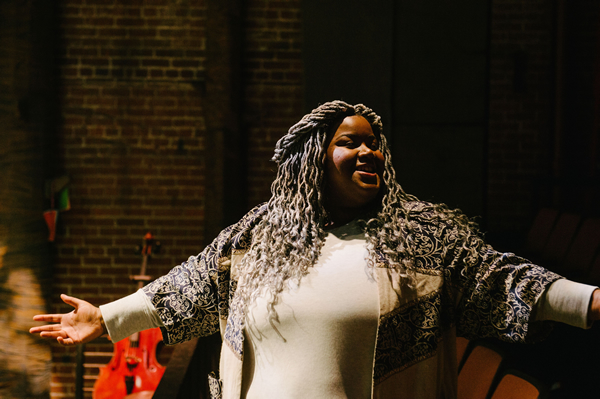
Jade Jones in ‘As You Like It,’ at Keegan Theatre. (Photo by Cameron Whitman)
‘As You Like It’
Through Dec. 2
Keegan Theatre
1742 Church St., N.W.
$62
202-265-3767
Untraditional casting and breaking gender stereotypes on stage aren’t new concepts. And for younger out actors like Broadway vet Stephen Brower and local up-and-comer Jade Jones, it’s all part of the job. In recent interviews, the talented pair share their respective experiences.
As Dmitry, the young con man turned princely love interest in the national tour of “Anastasia” now at the Kennedy Center, Brower adds an unexpected vulnerability to the part that other actors might not. Still, as the leading man in the Stephen Flaherty and Lynn Aherns’ musical about the mystery surrounding the last tsar’s fabled daughter, Brower brings the chemistry and romance.
In his program bio, Brower, 25, thanks the production’s producers and creative team for their trust and open-mindedness.
“The guys who played Dmitri before me, Derek Clena and Zach Adkins, are traditional leading men — masculine, tall strapping guys,” he says. “Unlike them, I’m tall and skinny with bad posture. So when I auditioned for the part, I went in with my bag tricks. I was quirky and making jokes, but unafraid to show sensitivity. And they trusted my take on the role.”
Traditionally actors have been taught that leading men need to be sexually appealing to be successful, Brower says. “I’ve seen a lot of naturally sexy people get cast over more talented actors. I guess it has to do with ticket sales. As an actor, you face a challenge in being marketable while trying to be honest with yourself. My upbringing and background — being an opening gay man raised in conservative Tulsa, Oklahoma — has a lot do with what I bring to the part.”
Fortunately for actors who might come across as somewhat less than butch, things are changing Brower says. “We are currently in an age where can challenge those perceptions and I feel great to be a part of that. I honestly don’t think I would have been cast as Dimitri 10 years ago.
“Still,” he adds, “there remains a lingering fear that when you walk into an audition room that you have to put on that swagger to make them fall in love with you and casting directors only fall in love with guys who are hypermasculine. Most actors are plagued by insecurities. It’s important to me that stereotypes of leading men are changed.”
Growing up in Tulsa, Brower came out at 15.
“My family was very supportive and I think I knew they would be. What’s more I attended a diverse school. Magnet school for general education that created a loving and supportive environment.”
He went on to earn a degree in musical theater at Texas State University in three years before heading to New York City. Soon after, he landed a professional gig and has been employed ever since.
Prior to playing Dmitry, Brower toured with “Pippin” and “An American in Paris.” Luckily, he enjoys life on the road. His boyfriend, an actor/dancer, is touring with “Wicked.”
“We get together when our schedules permit. It’s tough but we manage. It’s part of what actors have to do.”
Jade Jones, 28, has played a hippy in “Hair” at Keegan Theatre, a munchkin in Ford’s Theatre “The Wiz” and recently that notorious meat piemaker Mrs. Lovett in Stephen Sondheim’s musical “Sweeney Todd” at Rep Stage in Howard County, an experience Jones describes as her principal accomplishment to date.
Currently Jones is playing Senior Duke in Keegan Theatre’s “As You Like It,” a pop/rock musical take on the Bard’s romantic comedy by New York singer/songwriter Shaina Taub. It’s the third time Jones has been cast in a role written for a man.
“It’s really interesting casting and makes me realize that the sky is the limit,” says Jones, who sums up her attitude in a quote attributed to African-American ballet dancer Lauren Anderson: “Do I fit this mold? No. There is no mold in art.”
In the spring, Jones tackles Little Red Ridinghood in Sondheim’s “Into the Woods” at Ford’s. Her future working wish list includes playing Tennessee William’s iconic creations Blanche Dubois and Stanley Kowalski (though not in the same production).
Like Stephen Brower, Jones is familiar with insecurities.
“I never believed I had what it took to be a musical theater actor. I initially felt that I needed to separate my acting and vocal careers,” says Jones who’s often singled out for her magnetic stage presence and powerful, soulful voice. “But then fellow actors explained to me how I could, and really should, do both together. I also had a fear of dancing. Fellow actors helped me with that too. I’ve been fortunate to work with some very supportive people. I consider them my mentors.”
On Monday at Keegan Theatre’s annual gala held in their charming performance space on Church Street in Dupont, Jones will receive the company’s Emerging Artist Award given to younger artists who have performed on the Keegan stage and shown particular promise and demonstrated a collaborative spirit, a dedication to their craft, an exceptional work ethic and an ever-deepening love for the art form. Keegan Theatre Associate Artistic Director Susan Marie Rhea says, “Jade is a true triple threat, a performer of the highest caliber. But she’s more than that — she has passion, vision for her career and a love for life and her fellow artists that makes her a true joy to be around.”
Jones, who is single and lives in Dupont, says receiving the award is like “coming full circle.” As a Fairfax County high school student, Jones was introduced to the works of Tennessee Williams with Keegan’s “A Streetcar Named Desire.”
“I was blown away. It’s the reason why I’m an actor. After graduating from Ferrum College in Virginia, my first professional acting job was at Keegan in ‘Hair.’ That they’re celebrating my work is very exciting.”
Coming out to her religious parents wasn’t easy. Being gay was condemned from the pulpit and her parents agreed with that.
“But they’ve changed since then. When I look at them now and the way they have accepted me and other family members and my friends, it makes be believe that there is positive light in this world despite everything. It’s not hard to be LGBTQ in the theater community,” she says. “I don’t think there’s any profession that’s more accepting. It’s where I’m most comfortable.”
Theater
José Zayas brings ‘The House of Bernarda Alba’ to GALA Hispanic Theatre
Gay Spanish playwright Federico García Lorca wrote masterpiece before 1936 execution

‘The House of Bernarda Alba’
Through March 1
GALA Hispanic Theatre
3333 14th St., N.W.
$27-$52
Galatheatre.org
In Federico García Lorca’s “The House of Bernarda Alba,” now at GALA Hispanic Theatre in Columbia Heights, an impossibly oppressive domestic situation serves, in short, as an allegory for the repressive, patriarchal, and fascist atmosphere of 1930s Spain
The gay playwright completed his final and arguably best work in 1936, just months before he was executed by a right-wing firing squad. “Bernarda Alba” is set in the same year, sometime during a hot summer in rural Andalusia, the heart of “España profunda” (the deep Spain), where traditions are deeply rooted and mores seldom challenged.
At Bernarda’s house, the atmosphere, already stifling, is about to get worse.
On the day of her second husband’s funeral, Bernarda Alba (superbly played by Luz Nicolás), a sixtyish woman accustomed to calling the shots, gathers her five unmarried daughters (ages ranging from 20 to 39) and matter-of-factly explain what’s to happen next.
She says, “Through the eight years of mourning not a breeze shall enter this house. Consider the doors and windows as sealed with bricks. That’s how it was in my father’s house and my grandfather’s. Meanwhile, you can embroider your trousseaux.”
It’s not an altogether sunny plan. While Angustias (María del Mar Rodríguez), Bernarda’s daughter from her first marriage and heiress to a fortune, is betrothed to a much younger catch, Pepe el Romano, who never appears on stage, the remaining four stand little chance of finding suitable matches. Not only are they dowry-less, but no men, eligible or otherwise, are admitted into their mother’s house.
Lorca is a literary hero known for his mastery of both lyrical poetry and visceral drama; still, “Bernarda Alba’s” plotline might suit a telenovela. Despotic mother heads a house of adult daughters. Said daughters are churning with passions and jealousies. When sneaky Martirio (Giselle Gonzáles) steals the photo of Angustias’s fiancé all heck kicks off. Lots of infighting and high drama ensue. There’s even a batty grandmother (Alicia Kaplan) in the wings for bleak comic relief.
At GALA, the modern classic is lovingly staged by José Zayas. The New York-based out director has assembled a committed cast and creative team who’ve manifested an extraordinarily timely 90-minute production performed in Spanish with English subtitles easily ready seen on multiple screens.
In Lorca’s stage directions, he describes the set as an inner room in Bernarda’s house; it’s bright white with thick walls. At GALA, scenic designer Grisele Gonzáles continues the one-color theme with bright red walls and floor and closed doors. There are no props.
In the airless room, women sit on straight back chairs sewing. They think of men, still. Two are fixated on their oldest siter’s hunky betrothed. Only Magdelena (Anna Malavé), the one sister who truly mourns their dead father, has given up on marriage entirely.
The severity of the place is alleviated by men’s distant voices, Koki Lortkipanidze’s original music, movement (stir crazy sisters scratching walls), and even a precisely executed beatdown choreographed by Lorraine Ressegger-Slone.
In a short yet telling scene, Bernarda’s youngest daughter Adela (María Coral) proves she will serve as the rebellion to Bernarda’s dictatorship. Reluctant to mourn, Adela admires her reflection. She has traded her black togs for a seafoam green party dress. It’s a dreamily lit moment (compliments of lighting designer Hailey Laroe.)
But there’s no mistaking who’s in charge. Dressed in unflattering widow weeds, her face locked in a disapproving sneer, Bernarda rules with an iron fist; and despite ramrod posture, she uses a cane (though mostly as a weapon during one of her frequent rages.)
Bernarda’s countenance softens only when sharing a bit of gossip with Poncia, her longtime servant convincingly played by Evelyn Rosario Vega.
Nicolás has appeared in “Bernarda Alba” before, first as daughter Martirio in Madrid, and recently as the mother in an English language production at Carnegie Melon University in Pittsburgh. And now in D.C. where her Bernarda is dictatorial, prone to violence, and scarily pro-patriarchy.
Words and phrases echo throughout Lorca’s play, all likely to signal a tightening oppression: “mourning,” “my house,” “honor,” and finally “silence.”
As a queer artist sympathetic to left wing causes, Lorca knew of what he wrote. He understood the provinces, the dangers of tyranny, and the dimming of democracy. Early in Spain’s Civil War, Lorca was dragged to the the woods and murdered by Franco’s thugs. Presumably buried in a mass grave, his remains have never been found.
Theater
Magic is happening for Round House’s out stage manager
Carrie Edick talks long hours, intricacies of ‘Nothing Up My Sleeve’

‘Nothing Up My Sleeve’
Through March 15
Round House Theatre
4545 East-West Highway
Bethesda, Md. 20814
Tickets start at $50
Roundhousetheatre.org
Magic is happening for out stage manager Carrie Edick.
Working on Round House Theatre’s production of “Nothing Up My Sleeve,” Edick quickly learned the ways of magicians, their tricks, and all about the code of honor among those who are privy to their secrets.
The trick-filled, one-man show starring master illusionist Dendy and staged by celebrated director Aaron Posner, is part exciting magic act and part deeply personal journey. The new work promises “captivating storytelling, audience interaction, jaw-dropping tricks, and mind-bending surprises.”
Early in rehearsals, there was talk of signing a non-disclosure agreement (NDA) for production assistants. It didn’t happen, and it wasn’t necessary, explains Edick, 26. “By not having an NDA, Dendy shows a lot of trust in us, and that makes me want to keep the secrets even more.
“Magic is Dendy’s livelihood. He’s sharing a lot and trusting a lot; in return we do the best we can to support him and a large part of that includes keeping his secrets.”
As a production assistant (think assistant stage manager), Edick strives to make things move as smoothly as possible. While she acknowledges perfection is impossible and theater is about storytelling, her pursuit of exactness involves countless checklists and triple checks, again and again. Six day weeks and long hours are common. Stage managers are the first to arrive and last to leave.
This season has been a lot about learning, adds Edick. With “The Inheritance” at Round House (a 22-week long contract), she learned how to do a show in rep which meant changing from Part One to Part Two very quickly; “In Clay” at Signature Theatre introduced her to pottery; and now with “Nothing Up My Sleeve,” she’s undergoing a crash course in magic.
She compares her career to a never-ending education: “Stage managers possess a broad skillset and that makes us that much more malleable and ready to attack the next project. With some productions it hurts my heart a little bit to let it go, but usually I’m ready for something new.”
For Edick, theater is community. (Growing up in Maryland, she was a shy kid whose parents signed her up for theater classes.) Now that community is the DMV theater scene and she considers Round House her artistic home. It’s where she works in different capacities, and it’s the venue in which she and actor/playwright Olivia Luzquinos chose to be married in 2024.
Edick came out in middle school around the time of her bat mitzvah. It’s also around the same time she began stage managing. Throughout high school she was the resident stage manager for student productions, and also successfully participated in county and statewide stage management competitions which led to a scholarship at the University of Maryland, Baltimore County (UMBC) where she focused on technical theater studies.
Edick has always been clear about what she wants. At an early age she mapped out a theater trajectory. Her first professional gig was “Tuesdays with Morrie” at Theatre J in 2021. She’s worked consistently ever since.
Stage managing pays the bills but her resume also includes directing and intimacy choreography (a creative and technical process for creating physical and emotional intimacy on stage). She names Pulitzer Prize winning lesbian playwright Paula Vogel among her favorite artists, and places intimacy choreographing Vogel’s “How I learned to Drive” high on the artistic bucket list.
“To me that play is heightened art that has to do with a lot of triggering content that can be made very beautiful while being built to make you feel uncomfortable; it’s what I love about theater.”
For now, “Nothing Up My Sleeve” keeps Edick more than busy: “For one magic trick, we have to set up 100 needles.”
Ultimately, she says “For stage managers, the show should stay the same each night. What changes are audiences and the energy they bring.”
Theater
‘Octet’ explores the depths of digital addiction
Habits not easily shaken in Studio Theatre chamber musical

‘Octet’
Through Feb. 26
Studio Theatre
1501 14th Street, N.W.
Tickets start at $55
Studiotheatre.org
David Malloy’s “Octet” delves deep into the depths of digital addiction.
Featuring a person ensemble, this extraordinary a capella chamber musical explores the lives of recovering internet addicts whose lives have been devastated by digital dependency; sharing what’s happened and how things have changed.
Dressed in casual street clothes, the “Friends of Saul” trickle into a church all-purpose room, check their cell phones in a basket, put away the bingo tables, and arrange folding chairs into a circle. Some may stop by a side table offering cookies, tea, and coffee before taking a seat.
The show opens with “The Forest,” a haunting hymn harking back to the good old days of an analog existence before glowing screens, incessant pings and texts.
“The forest was beautiful/ My head was clean and clear/Alone without fear/ The forest was safe/ I danced like a beautiful fool / One time some time.”
Mimicking an actual step meeting, there’s a preamble. And then the honest sharing begins, complete with accounts of sober time and slips.
Eager to share, Jessica (Chelsea Williams) painfully recalls being cancelled after the video of her public meltdown went viral. Henry (Angelo Harrington II) is a gay gamer with a Candy Crush problem. Toby (Adrian Joyce) a nihilist who needs to stay off the internet sings “So anyway/ I’m doing good/ Mostly/ Limiting my time/ Mostly.”
The group’s unseen founder Saul is absent, per usual.
In his stead Paula, a welcoming woman played with quiet compassion by Tracy Lynn Olivera, leads. She and her husband no longer connect. They bring screens to bed. In a love-lost ballad, she explains: “We don’t sleep well/ My husband I/ Our circadian rhythms corrupted/ By the sallow blue glow of a screen/ Sucking souls and melatonin/ All of my dreams have been stolen.”
After too much time spent arguing with strangers on the internet, Marvin, a brainy young father played by David Toshiro Crane, encounters the voice of a God.
Ed (Jimmy Kieffer) deals with a porn addiction. Karly (Ana Marcu) avoids dating apps, a compulsion compared to her mother’s addiction to slot machines.
Malloy, who not only wrote the music but also the smart lyrics, book, and inventive vocal arrangements, brilliantly joins isolation with live harmony. It’s really something.
And helmed by David Muse, “Octet” is a precisely, quietly, yet powerfully staged production, featuring a topnotch cast who (when not taking their moment in the spotlight) use their voices to make sounds and act as a sort of Greek chorus. Mostly on stage throughout all of the 100-minute one act, they demonstrate impressive stamina and concentration.
An immersive production, “Octet” invites audience members to feel a part of the meeting. Studio’s Shargai Theatre is configured, for the first, in the round. And like the characters, patrons must also unplug. Everyone is required to have their phones locked in a small pouch (that only ushers are able to open and close), so be prepared for a wee bit of separation anxiety.
At the end of the meeting, the group surrenders somnambulantly. They know they are powerless against internet addiction. But group newbie Velma (Amelia Aguilar) isn’t entirely convinced. She remembers the good tech times.
In a bittersweet moment, she shares of an online friendship with “a girl in Sainte Marie / Just like me.”
Habits aren’t easily shaken.
-

 Massachusetts5 days ago
Massachusetts5 days agoEXCLUSIVE: Markey says transgender rights fight is ‘next frontier’
-

 Opinions4 days ago
Opinions4 days agoGay Treasury Secretary’s silence on LGBTQ issues shows he is scum
-

 U.S. Military/Pentagon4 days ago
U.S. Military/Pentagon4 days ago4th Circuit rules against discharged service members with HIV
-

 New York4 days ago
New York4 days agoLawsuit to restore Stonewall Pride flag filed

